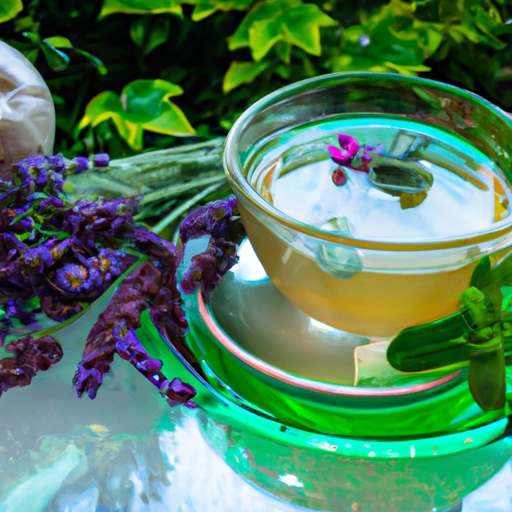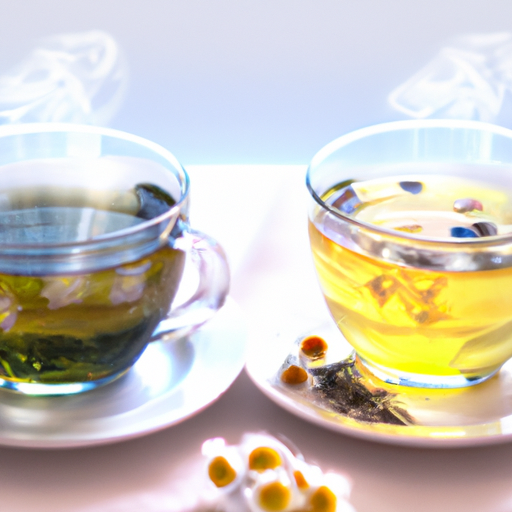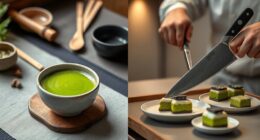Looking for a delightful way to stay hydrated while on the keto diet? Look no further than the world of sweet herbal teas! These delicious and refreshing beverages are not only a great way to quench your thirst, but they also offer a variety of health benefits.
In this article, I will share with you some of the best sweet herbal teas that are keto-friendly and perfect for satisfying your sweet tooth. From the soothing chamomile tea to the invigorating lemon ginger tea, there is a flavor for everyone to enjoy.
These teas are not only delicious, but they are also low in carbs and sugar, making them a perfect choice for those following a keto diet. So, grab your favorite mug, sit back, and indulge in a cup of sweet herbal tea that will keep you on track with your keto lifestyle. Cheers to good health and delicious flavors!
Key Takeaways
- Sweet herbal teas like chamomile, peppermint, rooibos, and hibiscus are suitable for the keto diet due to their low carbs and sugar content.
- Stevia leaf tea is a zero-calorie sweetener that can be used to add sweetness to herbal teas without impacting blood sugar levels.
- Choosing herbal teas without added sugars or artificial sweeteners is important for staying in ketosis.
- Lemon ginger tea is a keto-friendly option that not only adds flavor but also provides various health benefits such as boosting metabolism, aiding digestion, and supporting weight loss.
Chamomile Tea
You’ll love how chamomile tea not only satisfies your sweet tooth on the keto diet, but also helps calm your mind and relax your body after a long day. Chamomile has been used for centuries for its numerous health benefits. It’s known for its anti-inflammatory properties and can help improve digestion, promote better sleep, and boost the immune system.
This gentle and soothing herbal tea is a fantastic option for those following a keto diet. To enjoy chamomile tea, simply steep a tea bag or a teaspoon of dried chamomile flowers in hot water for about 5 minutes. You can also enhance the flavor by adding a squeeze of lemon or a teaspoon of honey substitute if you desire a sweeter taste without adding carbs.
Chamomile tea is incredibly versatile and can be enjoyed hot or cold, making it perfect for any time of the year. In addition to its health benefits, chamomile tea is also a great base for various recipes. You can use it as a flavorful liquid in smoothies or to infuse other dishes like rice or quinoa. Get creative and explore the many ways you can incorporate chamomile tea into your keto-friendly recipes.
Now, let’s move on to another delicious and sweet herbal tea option for the keto diet – peppermint tea.
Peppermint Tea
Sipping on a comforting cup of peppermint-infused goodness can transport you to a cozy winter evening by the fire. Peppermint tea, made from dried peppermint leaves, offers a delightful flavor and a range of health benefits.
Peppermint is known for its refreshing and invigorating flavor profile. It has a cool, minty taste with a hint of sweetness. This natural sweetness makes it an excellent choice for those on a keto diet who’re looking for a sweet herbal tea option without the added sugars.
Here are some of the benefits of peppermint tea:
- Supports digestion: Peppermint has been used for centuries to soothe digestive issues such as bloating, gas, and indigestion.
- Relieves headaches: The menthol in peppermint has analgesic properties that can help alleviate tension headaches and migraines.
- Boosts energy: The invigorating aroma of peppermint can provide a natural energy boost, making it a great alternative to caffeinated beverages.
Incorporating peppermint tea into your keto diet can be a delicious and beneficial choice. Now, let’s move on to explore the wonders of rooibos tea.
Rooibos Tea
Indulging in the rich and earthy flavors of rooibos can provide a sophisticated twist to your beverage selection. Not only does rooibos tea taste delicious, but it also offers numerous health benefits. Rooibos is packed with antioxidants that can help reduce inflammation and protect against chronic diseases. It’s also caffeine-free, making it a great option for those looking to cut down on their caffeine intake.
In addition to its health benefits, rooibos tea is incredibly versatile and can be enjoyed in various ways. You can simply steep the tea bags in hot water for a soothing cup of tea, or you can try experimenting with different recipes. For a refreshing twist, you can make iced rooibos tea by brewing it, letting it cool, and then adding ice and a squeeze of lemon. Another popular option is to blend rooibos tea with fruits and herbs to create flavorful herbal infusions.
Transitioning to the next section, let’s now explore the vibrant and tangy flavors of hibiscus tea.
Hibiscus Tea
Get ready to elevate your taste buds with the vibrant and tangy flavors of hibiscus tea, a popular choice among health-conscious individuals due to its high vitamin C content, which can boost your immune system and contribute to overall well-being. Here are three reasons why hibiscus tea should be on your keto-friendly herbal tea list:
-
Health benefits of hibiscus tea: Not only does hibiscus tea provide a refreshing and delicious beverage option, but it also offers several health benefits. Studies have shown that hibiscus tea may help lower blood pressure, reduce LDL cholesterol levels, and improve liver health. These benefits make it a great addition to your keto diet.
-
How to make hibiscus tea at home: Making hibiscus tea at home is simple and allows you to control the ingredients. Start by boiling water and adding dried hibiscus petals. Let it steep for around 5-10 minutes, depending on your taste preference. You can also add lemon juice or a natural sweetener like stevia to enhance the flavor without adding carbs.
-
Transition into the subsequent section: Now that you’ve learned about the health benefits and how to make hibiscus tea, let’s move on to another delicious and keto-friendly herbal tea option: stevia leaf tea.
Stevia Leaf Tea
Stevia leaf tea is a great option for those following a keto diet who are looking for a zero-calorie sweetener. It’s safe for consumption on the keto diet because it doesn’t contain any carbohydrates or sugar.
Stevia leaf tea provides a natural sweetness without impacting blood sugar levels, making it a practical choice for those on a low-carb diet.
Zero-calorie sweetener
Although there are several options available, you can still satisfy your sweet tooth on a keto diet by opting for a zero-calorie sweetener. Zero-calorie sweeteners have minimal impact on blood sugar levels, making them a suitable choice for individuals following a keto diet. Studies have shown that these sweeteners don’t cause a significant increase in blood glucose levels, making them a safe choice for those looking to maintain stable blood sugar levels.
When choosing a zero-calorie sweetener for your keto diet, it’s important to consider factors such as taste preferences, potential side effects, and overall health goals. Some popular choices include stevia, erythritol, and monk fruit extract. These sweeteners can be safely consumed on the keto diet, allowing you to enjoy a touch of sweetness without compromising your health goals.
Safe for consumption on the keto diet
You can safely incorporate this sugar substitute into your low-carb eating plan. When following a keto diet, it’s important to choose sweeteners that have minimal impact on blood sugar levels to maintain ketosis.
There are several low carb sweeteners that are suitable for the keto diet. Stevia, erythritol, and monk fruit are all natural, zero-calorie sweeteners that can be used in herbal teas without disrupting ketosis. These sweeteners don’t raise blood sugar levels and have a minimal impact on insulin secretion.
When choosing herbal teas, it’s important to select those that don’t contain any added sugars or artificial sweeteners. Opting for unsweetened herbal teas and adding your own keto-friendly sweeteners is the best way to ensure that you stay in ketosis while enjoying a delicious cup of tea.
Now, let’s move on to discussing the benefits of cinnamon tea.
Cinnamon Tea
Indulge in a warm cup of cinnamon tea, a delightful and keto-friendly option for satisfying your sweet cravings. Not only does cinnamon tea taste delicious, but it also offers several health benefits. Cinnamon is known for its anti-inflammatory and antioxidant properties, which can help reduce inflammation in the body and protect against oxidative stress. It may also help lower blood sugar levels and improve insulin sensitivity, making it a great choice for those following a keto diet.
To make cinnamon tea, simply steep a cinnamon stick in hot water for about 10 minutes. You can also add a squeeze of lemon or a dash of stevia for added flavor. This simple recipe allows you to enjoy the natural sweetness and warm spiciness of cinnamon without any added sugars or carbohydrates.
Now, let’s move on to another delicious herbal tea option that’s also keto-friendly: lemon ginger tea. It offers a refreshing and zesty flavor, along with its own set of health benefits. Soothing for the digestive system and packed with immune-boosting properties, lemon ginger tea is a great addition to your keto beverage repertoire.
Lemon Ginger Tea
Savor the invigorating blend of zesty lemon and warming ginger in this tantalizingly tangy and healthful cup of lemon ginger tea—perfect for those following a keto-friendly lifestyle. This delightful herbal infusion not only satisfies your taste buds but also provides numerous health benefits.
Here are some reasons why you should incorporate lemon ginger tea into your keto diet:
-
Boosts digestion: Both lemon and ginger have been traditionally used to aid digestion. Lemon stimulates the production of digestive juices, while ginger helps relieve nausea and promotes smooth digestion.
-
Supports immune system: Lemon is packed with vitamin C, known for its immune-boosting properties. Ginger, on the other hand, has antimicrobial and anti-inflammatory properties, which can help strengthen your immune system.
-
Promotes weight loss: Lemon ginger tea can be a great addition to your weight loss journey. It helps in boosting metabolism, curbing appetite, and aiding in the breakdown of fat cells.
-
Soothes inflammation: Ginger possesses powerful anti-inflammatory properties that can help alleviate inflammation in the body, including joint pain and muscle soreness.
Looking for ways to enjoy lemon ginger tea? Here are a few recipe ideas:
-
Classic lemon ginger tea: Simply steep fresh ginger slices and lemon wedges in hot water for 5-10 minutes. Add a touch of stevia or monk fruit sweetener for a keto-friendly twist.
-
Lemon ginger iced tea: Brew a strong batch of lemon ginger tea, let it cool, and serve over ice with a squeeze of fresh lemon.
-
Lemon ginger detox water: Infuse a pitcher of water with lemon slices, ginger slices, and a few mint leaves. Drink throughout the day for a refreshing and detoxifying beverage.
-
Lemon ginger green smoothie: Blend fresh spinach, ginger, lemon juice, and a low-carb sweetener with almond milk and ice for a nutritious and delicious keto-friendly smoothie.
Incorporating lemon ginger tea into your keto diet not only adds a burst of flavor but also offers a range of health benefits. So, sit back, relax, and enjoy this refreshing cup of goodness.
Frequently Asked Questions
Can I add milk or cream to my herbal tea on a keto diet?
Yes, you can add milk or cream to your herbal tea on a keto diet. However, it’s important to choose low-carb options like unsweetened almond milk or heavy cream. Avoid adding sugar or other keto-unfriendly sweeteners.
Are there any herbal teas that may have hidden sugars or carbohydrates?
Some herbal teas may contain hidden sugars or carbohydrates that can impact blood sugar levels. It’s important to carefully read labels and choose herbal teas that are free from added sugars to stay in line with a keto diet.
What are some potential side effects of consuming herbal teas while on a keto diet?
What potential side effects can occur when consuming herbal teas on a keto diet? While herbal teas can offer various benefits, some individuals may experience digestive issues, electrolyte imbalances, or interactions with medications.
Can herbal teas interfere with ketosis or the fat-burning process?
Herbal teas can affect ketosis in different ways. The choice of herbal tea can impact the body’s fat-burning process. It’s important to choose teas without added sugars or carbohydrates to maintain ketosis and maximize fat burning.
Are there any specific herbal teas that can help with keto flu symptoms?
To address keto flu symptoms, certain herbal teas can be beneficial. Herbal tea can provide relief from symptoms like fatigue and headaches due to its hydrating and antioxidant properties. Try recipes like ginger or peppermint tea for soothing effects.
Conclusion
After exploring the various options, it’s evident that when following a keto diet, there are several sweet herbal teas available. These teas not only provide a delightful taste but also offer numerous health benefits. From the calming effects of chamomile tea to the refreshing properties of peppermint tea, there’s a tea for every keto dieter’s preference.
Incorporating these herbal teas into your daily routine can enhance your keto journey and make it even more enjoyable. So, why not savor the pleasure of these euphoric brews while nourishing your body with wholesome goodness?










